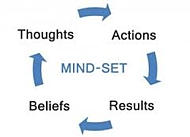One of the most common obstacles I am asked to help with sales amateurs and even professionals, concerns confidence and mindset. The sales process is full of rejections and challenges that constantly tests our inner belief. Sometimes to the point of questioning our abilities, our performance and even our purpose.
These challenges of the mind are inherit not just in sales but in our lives in general. We are conditioned to fear rejection and the unknown. Our inner defence does not want to expose our vulnerabilities and for most it is easier to play it safe.
What we must know is that logically fear, is an irrational response that in most cases has no real place in our mindset, other than the one we create for it. Why should we fear to ask questions? Why should we fear to ask for the sale? Why should we fear to sell?
For many it becomes a burden to impose themselves by selling. For the sales elite, it is about the challenge to achieve their goals and help the prospect make the right buying decision. “Their only fear is the opportunities that will be lost by not helping the customer buy!”
Here are 10 mindset strategies to overcome the anxiety of selling:
1. Solve Rather than sell
Stop selling or telling and start solving. Work with the client to solve their problem by asking questions that identify their requirements and so you are clear on what they need solving.
2. Understand the advantage is to your prospect
You are there to solve a problem that is inflicting your prospect. It is costing them pain, money, time and discomfort. You are there to take away their pain and add value to their solution by collaborating with the prospect
3. Talk back to your limiting beliefs
When it comes to that limiting voice in your head, tell that voice to approach to difficulties as challenges and setbacks as a reflection to personal growth. Every negative or positive has a lesson that drive our personal growth. Everyone has failures and makes mistakes but it is learning from these that strengthens our resolve.
4. Don’t be afraid to fail
Failure is not trying your best. With risk comes reward. Learn from these failures and it will boost your tenacity, confidence and attitude.
5. Believe in yourself and your solution
If there is any doubt in yourself or your solution then your prospect will see through this. You need to educate, understand and believe that the solution you are offering is the best.
6. Discover your motivation
What is the driver for you wanting to succeed? Is it money, recognition, thrill of the chase, to help people and business, to be successful, to be the best at what you do? Tap into your motivator and feed from it.
7. Be accountable
Don’t blame yourself for losing a sales but accept that you could have done something different. Revisit the situation and examine what you could have done differently. Use this new found knowledge in your next sale. The attitude of responsibility leads to more control over your life, higher self-esteem, self-confidence, and ultimately more happiness and success.
8. Plan and Prepare for selling
One of the most important impacts to your sales success is having a plan and being prepared. Having a sales guide or strategy that shows you how to overcome obstacles in the sale will make you more confident and powerful by having the answers you seek.
9. Surround yourself with Optimism & Drive
Top sales pros have a winning, optimistic mindset. They know that negative, bitter people with victim mindsets do not succeed in sales and tend to struggle through life. They attack each day with enthusiasm – fired up and ready to rock. Surround yourself with people who have an optimistic attitude even if it means getting new friends.
10. Develop a thirst for self-improvement
You don't go to school once. You are in school all your life. Sales superstars are constantly working to become better. They take courses, training, read books, listen to audiotapes and inhale everything they can to improve. The more you know about what you need to do the more empowering.
Creating the mindset for success in sales and life is about taking risks, actions and embracing change. It is about pushing away the voice on our shoulder that tells us why we can’t and take on the challenge to show just how easy it can be. It takes attitude, actions and effort. Those vital ingredients that differentiate those who say they can and those who really do!
What do you do to create a positive mindset?
Author
Emmanuel Lardis
Logicus Training Solutions
“Daring to be Different”
emmanuel@logicustraining.com.au
Logicus Training Solutions - Training and business Consultants





